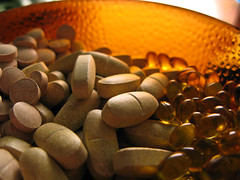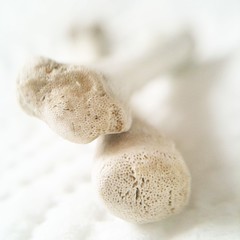 Image by bradley j via Flickr When the body does not meet the minimum requirement for thiamine, this is called thiamine deficiency or beriberi. This occurs due to insufficient consumption of thiamine or due to lack of absorption of thiamine especially for patients who underwent gastrectomy.
Image by bradley j via Flickr When the body does not meet the minimum requirement for thiamine, this is called thiamine deficiency or beriberi. This occurs due to insufficient consumption of thiamine or due to lack of absorption of thiamine especially for patients who underwent gastrectomy.Thiamine deficiency can be classified into two types. One affects the cardiovascular system and is termed wet beriberi. The second type affects the nervous system and is called dry beriberi.
In the United States, thiamine deficiency is uncommon since foods are now vitamin enriched. Only people who are heavy drinkers most often develop symptoms of beriberi. Excessive alcohol intake makes it difficult for the body to properly absorb thiamine. In worst cases, permanent brain damage can happen and this is called Wernicke-Korsakoff syndrome.
Patients who take diuretics or those who had undergone dialysis can develop beriberi. Infants with asymptomatic mothers who have beriberi can develop infantile beriberi since the milk produced by the mother does not contain or lacks thiamine.
Symptoms
Symptoms of dry beriberi are more on peripheral neurophaty: loss of sensation on feet and hands, paralysis of the lower leg, difficulty walking, confusion, back and forth eye movement (nystagmus), lack of concentration, difficulty talking, pain, vomiting, and tingling sensations.
Symptoms of dry beriberi affect mostly the heart. The symptoms include shortness of breath at night that causes the patient to awaken suddenly, shortness of breath after mild activity, palpitations, and edema of the lower extremities.
Treatment
Treating this type of deficiency is not really difficult. By simply correcting the levels of thiamine and maintaining it at sufficient levels will mitigate all symptoms. This is done by taking oral supplements or through injection of thiamine. To test how a patient responds to the medication, blood test is usually done after administration.
Prevention
Eating foods rich in thiamine such as oat meal, eggs, liver, potatoes, oranges, flax and sunflower seeds. Daily vitamin supplements are also an excellent source of thiamine. Refrain from drinking alcohol. Raw meat from fresh water fish and shellfish contain thiaminase. Thiaminase is a enzyme that breaks down thiamine. It is suggested to cook fish and shellfish thoroughly.


